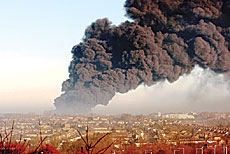HEMEL HEMPSTEAD, England — A massive explosion wiped out half a main aviation and domestic fuel distribution depot in Hemel Hempstead 40 kilometres north of London early yesterday morning.
Forty one people were slightly injured and two more seriously.
At 6.03 a.m. a series of explosions produced a huge ball of fire, destroying at least two tanks in the Buncefield depot — the fifth largest in the UK — containing some 30 million liters of fuel.
It tore buildings and offices in the fuel depot apart and lifted the roofs of houses over a kilometer away.
The explosion took place between shifts as tanker drivers entered the depot to fill their vehicles.
Fire services have contained the fire and the pipes feeding the depot have been shut.
The fire chief in Hemel Hempstead said that this was the biggest ever peacetime explosion in the UK.
Hetfordshire Chief Constable Frank Whitely said early in the day that more explosions were expected, but there was no cause for alarm.
A second explosion at lunch time sent another fireball high into the air and ten hours after the explosion, flames were burning even more intensely that after the initial blast.
Police are treating the incident as an accident but are not ruling out any possibility.
However investigating teams will be able to do nothing until the fire has been quenched.
Fire services report that supplies of foam to quench the flames are being delivered to the site and will be mixed overnight.
The services say that they need sufficient foam to extinguish the flames in one concerted effort, which is planned for first light today otherwise the fire would probably restart.
Mike Penny, the Member of Parliament for Hemel Hempstead and a former fireman, said from the forward fire point, “they cannot physically put this fire out — they will starve it of fuel, there will be further explosions — nothing like the first. All they can do is contain it. First thing is to make sure people are safe — we can sort the rest out later.”
He said that safety had never been an issue at the Buncefield depot, which started operations in 1968. The plant was fully automated and monitored 24 hours a day, originally built to military specifications.
Only nine people man the site at any one time.
“These things happen,” he said, “but are very rare.”
Ray Holloway from the Petrol Retailers Association said that during the day people had begun panic buying petrol.
“There will be no noticeable will be no affect on supplies,” he said, “this depot is one of many. Any shortage will be a self inflicted misery.”
He confirmed that emergency deliveries will be made following procedures in place; “the oil industry will cope with it.”
The Buncefield depot mainly supplies London’s main airports — Stanstead, Heathrow and Luton.
Their supplies are being rerouted from other depots with Heathrow tapping into the Fawley refinery in Southampton.
Smaller airports may be affected — but all can switch to alternative fuel resources.
Heathrow takes about 30 percent of its fuel from Buncefield and holds 48 hours supply of fuel in reserve.
The huge pall of smoke has affected flights into Heathrow, as incoming flights that are stacked in a landing pattern over the area have had to be diverted to alternative areas.










